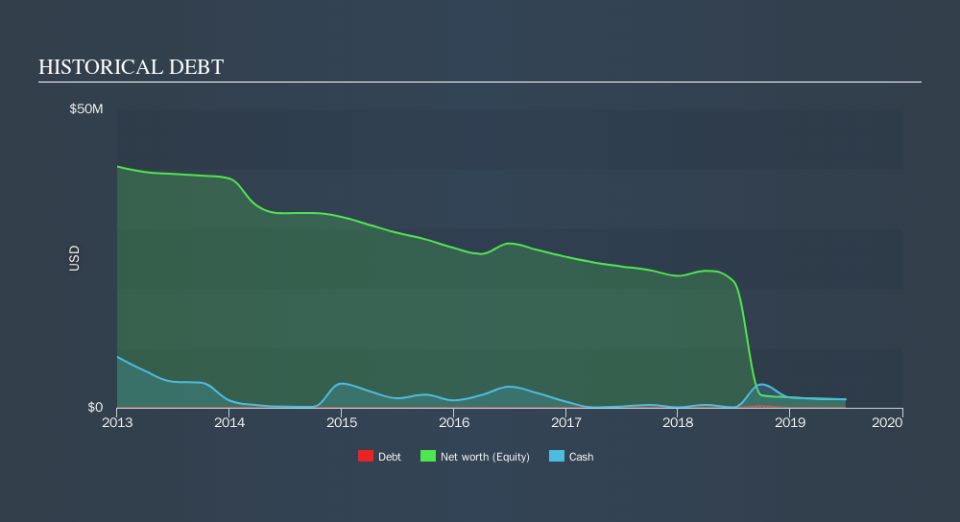Hunter Oil (CVE:HOC) Is Very Risky Based On Its Cash Burn

There's no doubt that money can be made by owning shares of unprofitable businesses. For example, although software-as-a-service business Salesforce.com lost money for years while it grew recurring revenue, if you held shares since 2005, you'd have done very well indeed. Having said that, unprofitable companies are risky because they could potentially burn through all their cash and become distressed.
Given this risk, we thought we'd take a look at whether Hunter Oil (CVE:HOC) shareholders should be worried about its cash burn. For the purpose of this article, we'll define cash burn as the amount of cash the company is spending each year to fund its growth (also called its negative free cash flow). The first step is to compare its cash burn with its cash reserves, to give us its 'cash runway'.
Check out our latest analysis for Hunter Oil
Does Hunter Oil Have A Long Cash Runway?
You can calculate a company's cash runway by dividing the amount of cash it has by the rate at which it is spending that cash. When Hunter Oil last reported its balance sheet in June 2019, it had zero debt and cash worth US$1.4m. In the last year, its cash burn was US$3.4m. So it had a cash runway of approximately 5 months from June 2019. That's a very short cash runway which indicates an imminent need to douse the cash burn or find more funding. However, if we extrapolate the company's recent cash burn trend, then it would have a longer cash run way. Depicted below, you can see how its cash holdings have changed over time.
How Is Hunter Oil's Cash Burn Changing Over Time?
Because Hunter Oil isn't currently generating revenue, we consider it an early-stage business. Nonetheless, we can still examine its cash burn trajectory as part of our assessment of its cash burn situation. In fact, it ramped its spending strongly over the last year, increasing cash burn by 119%. It's fair to say that sort of rate of increase cannot be maintained for very long, without putting pressure on the balance sheet. Hunter Oil makes us a little nervous due to its lack of substantial operating revenue. So we'd generally prefer stocks from this list of stocks that have analysts forecasting growth.
How Easily Can Hunter Oil Raise Cash?
Given its cash burn trajectory, Hunter Oil shareholders should already be thinking about how easy it might be for it to raise further cash in the future. Issuing new shares, or taking on debt, are the most common ways for a listed company to raise more money for its business. Commonly, a business will sell new shares in itself to raise cash to drive growth. By comparing a company's annual cash burn to its total market capitalisation, we can estimate roughly how many shares it would have to issue in order to run the company for another year (at the same burn rate).
Since it has a market capitalisation of CA$3.4m, Hunter Oil's US$3.4m in cash burn equates to about 131% of its market value. That suggests the company may have some funding difficulties, and we'd be very wary of the stock.
So, Should We Worry About Hunter Oil's Cash Burn?
As you can probably tell by now, we're rather concerned about Hunter Oil's cash burn. Take, for example, its cash burn relative to its market cap, which suggests the company may have difficulty funding itself, in the future. And although we accept its increasing cash burn wasn't as worrying as its cash burn relative to its market cap, it was still a real negative; as indeed were all the factors we considered in this article. The measures we've considered in this article lead us to believe its cash burn is actually quite concerning, and its weak cash position seems likely to cost shareholders one way or another. While we always like to monitor cash burn for early stage companies, qualitative factors such as the CEO pay can also shed light on the situation. Click here to see free what the Hunter Oil CEO is paid..
Of course, you might find a fantastic investment by looking elsewhere. So take a peek at this free list of companies insiders are buying, and this list of stocks growth stocks (according to analyst forecasts)
If you spot an error that warrants correction, please contact the editor at editorial-team@simplywallst.com. This article by Simply Wall St is general in nature. It does not constitute a recommendation to buy or sell any stock, and does not take account of your objectives, or your financial situation. Simply Wall St has no position in the stocks mentioned.
We aim to bring you long-term focused research analysis driven by fundamental data. Note that our analysis may not factor in the latest price-sensitive company announcements or qualitative material. Thank you for reading.

 Yahoo Finance
Yahoo Finance 
